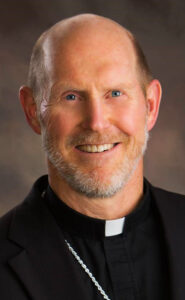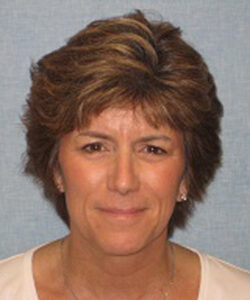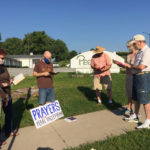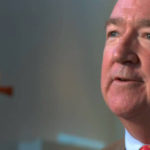By Barb Arland-Fye
The Catholic Messenger
Taking the time to develop a global approach to strengthening bishops’ accountability in their response to clergy sexual abuse is the right thing to do, Bishop Thomas Zinkula believes.

But he admits, “I was as surprised as everyone else” regarding the Vatican’s request for a delay in the U.S. Conference of Catholic Bishops’ proposal to adopt stronger, concrete measures at their fall meeting in Baltimore. Pope Francis decided the issue needs to be addressed at a special meeting to be held in February at the Vatican with the presidents of bishops’ conferences from around the world.
“A lot of bishops were unhappy about the delay and said so, but I think it might be a blessing in disguise,” Bishop Zinkula told The Catholic Messenger after returning from the Nov. 12-14 meeting in Baltimore.
Bishop Zinkula said he thought the process for adopting changes seemed rushed. “We weren’t ready to make a final decision.” He described the atmosphere of the general assembly as somber, emotional and draining. Meals were simple. The first day focused on prayer, looking at the problem of clergy sexual abuse and the harm that has been done.
Several presenters brought that message home, including representatives of the National Review Board, the National Advisory Council and Spirit Fire. The latter describes itself as “a partnership with survivor leaders who are cultivating inspired and renewed relationships for all hurt by abuse and all members of the Catholic Church.” The presenters “didn’t pull any punches,” Bishop Zinkula said.
Somberness gave way to hope at the meeting with his fellow bishops. “We were talking with each other, listening to each other. This is a work in progress.” That sense of hope was reinforced by the closing statement of Cardinal Daniel DiNardo, president of the USCCB. He established a task force to convert into specific action steps the direction provided by the bishops and by survivors of abuse. Action steps include:
• A process for investigating complaints against bishops reported through a third-party compliance hotline. Within that proposal: creation of a single national lay commission and a national network relying on the established diocesan review boards.
• Finalizing the Standards of Accountability for bishops.
• Finalizing the protocol for removing bishops.
• Studying national guidelines for the publication of lists of clerics facing substantiated claims of abuse. (The Diocese of Davenport already maintains a website list of the names of clergy with credible allegations of clergy sexual abuse.)
• Supporting the fair and timely completion of various investigations regarding Archbishop Theodore McCarrick, who has been accused of credible allegations of sexual abuse of a minor and of seminarians.
Cardinal DiNardo observed that “our hope for true and deep reform ultimately lies in more than excellent systems, as essential as these are. It requires holiness: the deeply held conviction of the truths of the Gospel, and the eager readiness to be transformed by those truths in all aspects of life.”
Bishop Zinkula said people he has heard from in the Diocese of Davenport want the bishops to deal with the clergy sexual abuse issue definitively and appropriately, and move forward with the work of the church.
Statement on racism
During the fall meeting, the USCCB adopted a pastoral letter on racism that Bishop Zinkula described as excellent. “It addresses the issue in general, but also broke it down to speak about particular groups that have been and are subjected to racism: Native Americans, African Americans and Hispanics, specifically.”
The letter states that the “cumulative effects of the personal sins of racism have led to social structures of injustice and violence that makes us all accomplices in racism.” Furthermore, racism “still profoundly affects our culture, and it has no place in the Christian heart.”
The letter also acknowledges the church’s culpability. “The truth is that the sons and daughters of the Catholic Church have been complicit in the evil of racism … much to our shame, many American religious leaders, including Catholic bishops, failed to formally oppose slavery; some even owned slaves.” Paternalistic and racist attitudes also blocked the way to a fully indigenous clergy and religious in world missions, the letter states. And not long ago, “in many Catholic parishes, people of color were relegated to segregated seating, and required to receive the Holy Eucharist after white parishioners.”
In general, the letter invites Catholics to:
• Do justice. Recognize and respect the legitimate rights of individuals and peoples.
• Listen to and know the stories of our brothers and sisters. Create opportunities to hear, with open hearts, the tragic stories that are deeply imprinted on the lives of our brothers and sisters. Much can be learned in hearing the stories of those who have lived through the effects of racism.
• Examine where the racist attitudes of yesterday have become a permanent part of our perceptions, practices and policies of today or how they have been enshrined in our social, political and economic structures.
• Examine the generational effects of racism on families, communities and our church, so that each of us can begin to act in solidarity to change the prospects for future generations.
• Examine our own consciences pertaining to our attitudes about race. Do these attitudes reflect mistrust, impatience, anger, distress, discomfort or rancor?
• Remember, the love of Christ impels us to see others as our brothers and sisters.
To read the pastoral letter on racism in its entirety, go to: https://tinyurl.com/hacmrb8.
Bishop Zinkula and his fellow bishops also voted to support the advancement of the cause for sainthood of the Servant of the Lord Sister Thea Bowman, FSPA (1937-1989). The bishops’ pastoral letter identifies her among the African Americans who “worked tirelessly against the prevailing current of racism to share the Catholic faith with persons of African descent.”
Diocesan Review Board member serves on National Advisory Council
Chris McCormick Pries, a member of the Diocese of Davenport’s Review Board, serves on the U.S. Conference of Catholic Bishop’s (USCCB) National Advisory Committee. Bishop Thomas Zinkula nominated her this past summer for an opening on the committee, which she was selected to fill. She shared her thoughts about the work of the National Advisory Council (NAC) with The Catholic Messenger:
What is NAC? The National Advisory Council or NAC for short, includes bishops, priests, women and men religious, permanent

deacons and laity. The resulting council has been described as “the church in miniature” not only because of its racial, ethnic, occupational and geographic diversity, but also because it often reflects the tensions within the church.
What is your role in NAC? My role, as a new member, was to become familiar with the work of NAC and the topics of discussion the bishops were asking opinion and feedback on. The USCCB is obviously a complex organization with many subcommittees focused on pertinent topics to the members of the church (evangelization, marriage and family life, vocations, prejudice and immigration to name a few).
What was unusual about NAC’s fall meeting? This particular meeting was different — due to the recent national discussion of sexual abuse in the church and the accusations that bishops and church hierarchy had covered and ignored the problem throughout the United States for decades. As a result of the recent revelations and news stories, NAC members believed there was no more important topic to be addressed, as this struck at the very heart of the church. Without transparency about this issue and a proposed solution to end this, the future of the church appeared threatened.
What do you bring to the table at NAC? Much to my surprise, aside from the members who were bishops, no other member had been a part of a Diocesan Review Board or was familiar with the process of how complaints are received or followed up on. In spite of this being my first meeting, I found I was asked many times to discuss how reports of abuse are received, how they are investigated, how law enforcement is involved, as well as other practical questions. I found rather than being new to the discussion, I had very real information to share and was able from the first evening to fully participate in the work of the NAC.
What was the outcome of that meeting? After three days of prayer, study, discussion and small group meetings a statement was written summing up the work of the council to be presented to the executive committee of the USCCB the following week, well ahead of the November meeting in Washington, D.C.
What do you take away from your first NAC meeting? I was impressed by the sincerity, openness and genuine compassion of the NAC members I met and worked with in Baltimore, and look forward to meeting with them again in March 2019 to continue this very important work. As a NAC member, I will serve for four years, attending two meetings a year. I feel so blessed to have been nominated and selected.











